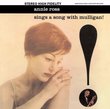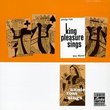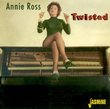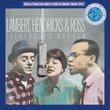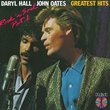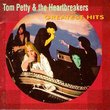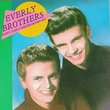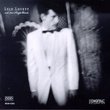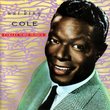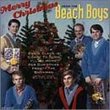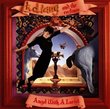| All Artists: Lambert Hendricks & Ross Title: Sing a Song of Basie Members Wishing: 4 Total Copies: 0 Label: Polygram Records Original Release Date: 1/1/1955 Re-Release Date: 2/6/2001 Album Type: Extra tracks, Original recording remastered Genres: Jazz, Pop, Broadway & Vocalists Styles: Traditional Jazz & Ragtime, Vocal Jazz, Bebop, Oldies, Vocal Pop, Traditional Vocal Pop Number of Discs: 1 SwapaCD Credits: 1 UPC: 731454382724 |
Search - Lambert Hendricks & Ross :: Sing a Song of Basie
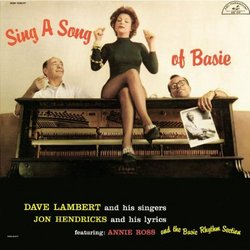 | Lambert Hendricks & Ross Sing a Song of Basie Genres: Jazz, Pop, Broadway & Vocalists
Sing a Song of Basie marked the birth of the jazz vocal group, the arrival of the Lambert, Hendricks, and Ross trio before they had even found their name and identity. First released in 1958, it's still a joyous romp throu... more » |
Larger Image |
CD DetailsSynopsis
Amazon.com Sing a Song of Basie marked the birth of the jazz vocal group, the arrival of the Lambert, Hendricks, and Ross trio before they had even found their name and identity. First released in 1958, it's still a joyous romp through some Basie hits, with arranger Dave Lambert, lyricist Jon Hendricks, and lead singer Annie Ross defining the new form for posterity. Will Friedwald's new liner notes chronicle the birth pains, including Lambert and Hendricks's initial struggles to do the material with a choir of pop backing singers before hitting on the potential of new overdubbing technology to multiply three voices that could actually sing jazz. The ultimate results created a sensation, and none of the preliminary struggles show in the finished product. The three singers do some extraordinary simulations of horn parts--both ensembles and solos--with Hendricks's casually tongue-twisting, finger-snapping hip lyrics verbalizing the spirit of jazz in a fresh way. Tunes such as "One O'Clock Jump" and "Blues Backstage" swing with the ease of the Basie band itself, propelled by pianist Nat Pierce and the Basie rhythm section of the day, guitarist Freddie Green, bassist Eddie Jones, and drummer Sonny Payne. The CD also includes Lambert and Hendricks's first collaborations from 1955, their version of "Four Brothers" and "Cloudburst" and a previously unreleased version of Hendricks's "Standin' on the Corner." --Stuart Broomer Similar CDs
Similarly Requested CDs
|
CD ReviewsStellar in every way Eric | Canada | 10/07/2003 (5 out of 5 stars) "I lack words to express the way I feel about this album without sounding silly. It really is an extraordinary album, truly a landmark album in jazz.First of all it presents some of the greatest tunes of Basie. The originals by Basie are already wonderful, but singing the arrangements and putting words on Lester Young solos is just out of this world, it is a mark of genius. Jon Hendricks is truly stellar, with his hip style (ya dig it?). His sidekicks are excellent as well.I have worn out this album so much it's not even funny. If you are into Basie and/or vocalese, get it now.Perhaps some people will point out the overlap with the compilation called Everybody's boppin; well I say get that one as well. :-) In fact get everything by LHR while you're at it. And get Double Six albums too because their covers of the Quincy Jones / Basie tunes from the late 50's is the other side of this vocalese coin." The best of the best Rick Cornell | Reno, Nv USA | 01/14/2004 (5 out of 5 stars) "Despite the impressive moments of the Manhattan Transfer and The New York Voices, L H & R remains the greatest vocal jazz ensemble ever. And this is the best of their all too few albums. Their covers/re-creations of Basie's "Down for Double", "Avenue C", "Backstage Blues", and of course, the Basie signature tune of "One O'Clock Jump", are wonders to behold. Annie Ross was at her peak in this album, and it shows; without her, this group is "pretty good"; with her, and the group is--well, I just said." Only one problem... William P. Magliocco | Atlanta, GA USA | 05/04/2004 (4 out of 5 stars) "This would have been a five star album, if it were not for the distortion present. I have heard certain of these selections on at least 3 CD releases. It is my belief that the distortion comes from the master tapes and the overdubbing techniques used at the time. The end of "Down for Double" is a good example, when Annie goes for the big finish.The earlier "bonus" tracks on the album sound better, as they were not overdubbing like mad. Les Paul recordings of this era suffer the same fate.If you want me to grade on the performance holding the recording quality aside, I would give it the 5/5 grade as so many others have."
|

 Track Listings (13) - Disc #1
Track Listings (13) - Disc #1